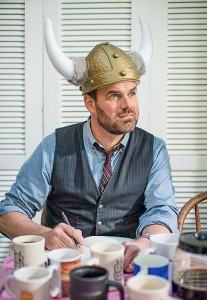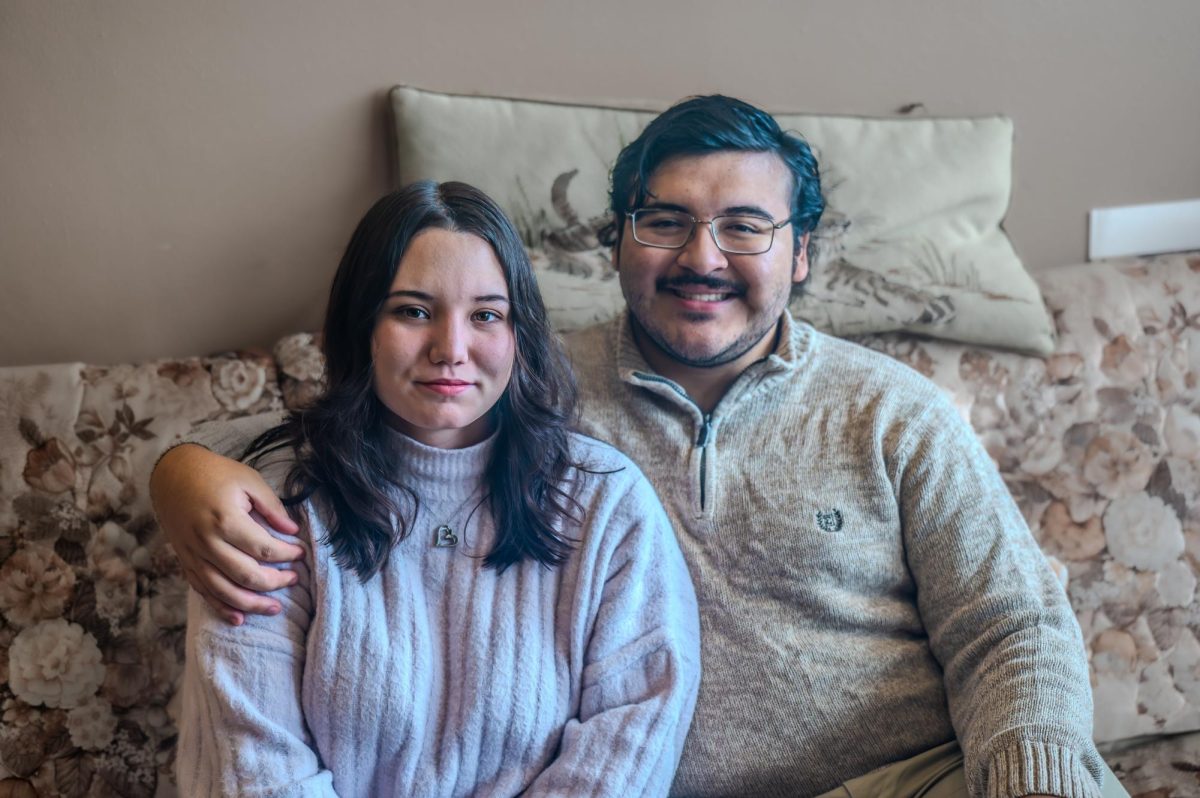
Grant Faulkner ’87 is the Executive Director of National Novel Writing Month (NaNoWriMo), an organization that helps guide and motivate nearly 500,000 people annually to write a 50,000 word novel during the month of November. He also runs a flash fiction magazine called 100 Word Story. The S&B’s Eric Mistry ’14 interviewed Faulkner this week to discuss Grinnell, NaNoWriMo and writing.
How did your Grinnell experience shape your life and writing style?
I guess I’ll focus on how it helped me develop as a writer. I was at a kind of crossroads when I was a sophomore; I was deciding whether to be an Econ major or English major, and I did Grinnell’s study abroad in Tours [France] and it was great. Beyond just living in France and studying French, it was just a time to do a lot of reading. My friends and I, we just sat in cafes and read and wrote. I wrote a lot; I’d always thought about being a writer, but I never questioned it after that. I returned home that summer and then lived on my grandparent’s old farm where they didn’t actually live anymore. I lived in this old dilapidated converted chicken coop. It was basically a shack with electricity; I lived there the whole summer and wrote for the first time and never turned back.
Grinnell, in terms of its influence on me as a writer, was my introduction to the serious study of literature. I just read so many different things from so many different eras and just thought critically about what makes writing good. Especially my conversations with my peers and friends, those were so stimulating and challenging.
I think the dominant thing that I remember is being in the library or ARH and just ingesting crazy amounts of coffee and studying late into the night. I remember having those study sessions always interrupted by those tangential, fascinating conversations. I’d always be with my study partners, and we’d always be talking about something, likely extraneous from our studies but worthwhile in developing one’s mind creatively. And of course, following that up with a trip to the pub, a campus party, or something like that; definitely drinking into the wee hours.
It was an era of intensity in all realms, and I think that was what made it so special. I loved my professors at Grinnell. They were smart and challenging, but when I really think about the thing I learned, it came from the peer group that Grinnell provided wonderfully. Going to class was one thing, being in the mix with all of these other great minds was what really made it wonderful.
What was your path from Grinnell to your current position at NaNoWriMo?
Sometime in my mid-to-late 20s, I decided, ‘Hey, if I’m writing and reading all the time, I might as well get a degree for this.’ So I got my MFA, which was my pathway that allowed me to teach at a community college. I wasn’t making enough money doing that, so I transitioned into journalism, working as a reporter for the Des Moines Register for a year, then freelanced for all sorts of different magazines. That led me to a job with corporate communications with Charles Schwab, which wasn’t me at all; I didn’t want to work for a corporation. Fortunately, I got out of that and got a great job at the National Writing Project. So that was the first time I had really had a professional home in my field. That led to me being on the board of NaNoWriMo. When I got on the board, the founder told me he was stepping down and felt that I should apply for the job. It wasn’t by any grand design, but I’m definitely at home here, more than any job.
Our hope is that after doing this for a month, people gain momentum to do it throughout their lives, writing every day or every month, just making creativity a priority in their lives. We also have inspirational pep talks written by really famous and successful writers; they aren’t about the how-tos of writing, they’re more about that spirit of you can do it and to keep going.
What is NaNoWriMo?
I think the short answer is: it’s an unbeatable recipe to write a novel. You write 50,000 words in 30 days. What’s most important is that people realize their creative lives through NaNoWriMo. When you’re an adult, or maybe at any age, your to-do lists really start to run your life. It’s really easy for creativity to fall really low on that list or even fall off of it. Just by signing up for National Novel Writing Month, you pledge to make creativity a priority for you for a month. We provide the encouragement, empowerment and inspiration to then help people succeed. We have this great community of support, both online and offline; we have over 700 volunteers who run face-to-face write-ins, so people write together.
Our hope is that after doing this for a month, people gain momentum to do it throughout their lives, writing every day or every month, just making creativity a priority in their lives. We also have inspirational pep talks written by really famous and successful writers—they aren’t about the how-to’s of writing, they’re more about that spirit of you can do it and to keep going.
How does one make it through 50,000 words in a month?
I think it’s really about showing up every day and making progress. That 1500-2000 words takes me about an hour and a half to two hours to write each day. I think that’s a reasonable commitment. I think sometimes people think, ‘50,000 words, that’s so much! I can’t ever do that.’ But if you break up any large task into smaller bits, it gets so much easier.
You talked earlier about how writing is social endeavor. How would you say the rise of social media and Internet culture has affected writing?
I think writing is now more important than it ever has been in the history of the world. Everybody is a writer, everybody is writing on Facebook and Twitter. To write a good tweet, in 140 characters, that takes writing skills. I think this is the golden age of writing; it’s never been more important and will continue to be more and more important. I think the way that people are expressing themselves through writing is taking more and more skill, so we should emphasize that more in our education system. I think there’s also just more creativity going on. We don’t have to pigeonhole creative writing as being about the short story or the novel or poetry; there’s a certain type of poetry that happens on Facebook and Twitter everyday.
Your other main project is called 100 Word Story. What is that and what is the unique challenge of writing a story in 100 words?
It’s really challenging to write a good story in 100 words. I co-founded [100 Word Story] with a friend almost three years ago. Another Grinnell friend of mine, his father had written a book of 100 100 word stories. I had read his book, his stories, and I really liked them. I had dabbled in flash fiction, but I tried writing a 100 word story, and it was a really difficult task. I could only get my stories down to 150 words. I didn’t know how to get them down to 100. The more I did it, the more I saw the benefits of the form. Most of writing education is about writing more, getting in more pages, writing in more details, especially in academic writing. We seldom teach people how to write less.
I think writing concisely is more important than ever, whether you’re writing fiction or other writing. I took it on as a challenge, to see what could happen with the most concise story possible for me. I just think there are a lot of amazing benefits in learning to write like that. It’s an interesting challenge. The best 100 word stories to me have a beginning, middle and end, like a traditional story, but you’re moving the story so differently. Every sentence, every word matters. Even the gaps between the sentences kind of wrap the story. You’re inviting the reader in to fill in those gaps. It’s a different reading experience, similar to reading poetry.
What kind of writing do you currently do? I do write in a variety of different forms. I definitely write novels, I’m wrapping up a novel that I’ve been working on and off on for ten years, so I’ll have that done in January or February of next year. I’m also finishing a collection short stories I’ve written over the last ten to twenty years and then I also have a collection of one hundred word stories I should finish sometime in 2014. Those are my three main writing projects, but I’ve also got some novels in the queue. I also write the occasional essay; I just had an essay printed in the [New York] Times last month called “Going Long, Going Short” about the process of writing novels but also in the shorter format.
What’s your personal writing process?
It’s really changed. I’ve talked about, in my twenties, how I would wait tables at night and write during the day—that was before I had kids and a nine-to-five job. Now that I have kids and a job, I have to write in all those weird little pockets of time. I wake up early most days. Today I was up at five o’clock to write. I also write the occasional piece, or even notes during things like my kids’ soccer games. I don’t always write during my best hours. I sometimes have to write just to write, to keep that momentum going, kind of like NaNoWriMo.



















































